How Mimi Choi Went From Preschool Teacher to Instagram's Most Sought-After Illusion Makeup Artist
The creative talent behind Ezra Miller's trippy, multi-eye illusion look from the 2019 Met Gala has had a somewhat unconventional career path.
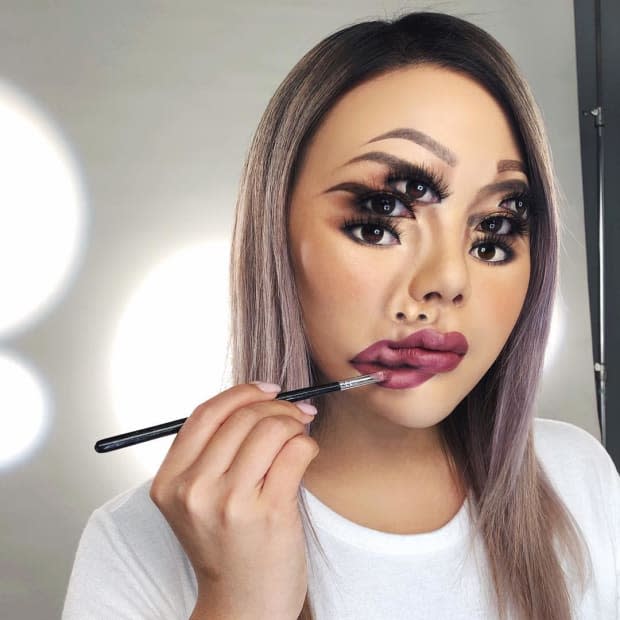
In our long-running series, "How I'm Making It," we talk to people making a living in the fashion and beauty industries about how they broke in and found success.
You may not know makeup artist Mimi Choi by name, but you've most likely seen — and marveled at — her work. Especially if you paid any attention to the 2019 Met Gala. Known for stunningly realistic illusions and 3-D effects, Choi showed off her mind-boggling skills at this year's fashion prom via Ezra Miller, who sported one of her classic, trippy, "multi-feature" looks for the occasion. Her attention to detail, seemingly boundless creativity and raw artistic talent have earned her plenty of industry attention, master class opportunities and partnerships with brands like MAC and Make Up For Ever — not to mention a whopping 1.1 million followers on Instagram.
And yet, she's only been at it for about five years. Choi's first career was as a preschool teacher in Vancouver, where she still lives. Having immigrated there from Macau, a Portuguese colony in China, with her parents as a child, she spent most of her time growing up focused on academics, with little time to devote to the arts (let alone makeup art). But in her 20s, she began feeling listless and burned out, at which point her mother suggested she make a change and pursue her creative passions.
Choi's work, which evokes such artistic visionaries as Salvador Dalí and M.C. Escher, can be fantastical, unnerving and even disturbing. She suffers from sleep paralysis, experiencing bouts during which she has vivid, sometimes morbid and frightening, visions, which she then channels into her makeup artistry as a means of self-expression and self-care."You might find it bizarre that I like to paint weird things on my face and other people's faces to be happy, but that's what it is. It makes me happy so I'm going to continue to do it," she says.
Just a week after the Met Gala, Choi took some time to discuss her unique career trajectory — and arguably more unique makeup style — with Fashionista. Read on for the highlights.
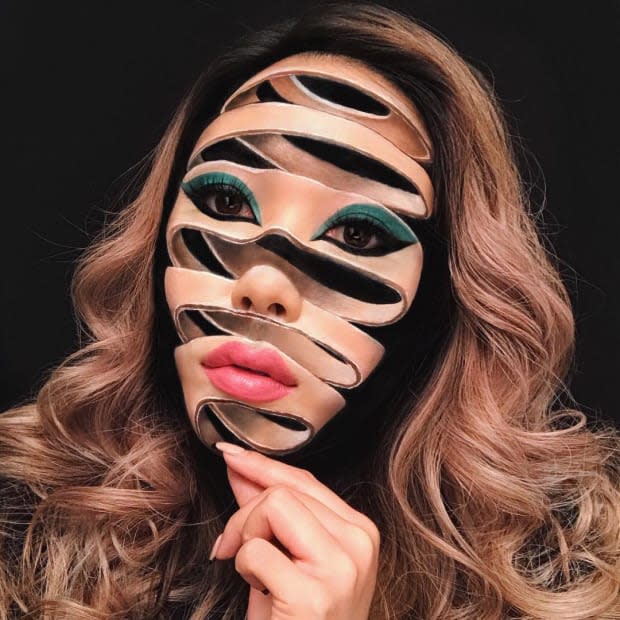
Tell me a little bit about your background and when you first got interested in makeup.
I only actually started doing makeup five years ago. I was a preschool Montessori teacher before, and for three years I had my own classroom and I was teaching little children from two years old to six years old and I thought my life was set, but I wasn't completely happy. I thought it was normal to feel that way. It got to a point where after three years I was constantly burned out and stressed, even though I loved children. But doing my own makeup became a habit to release stress.
One night my mom asked me one question that changed my life, if I saw myself being happy being a preschool teacher for the next 30 years. It kind of shocked me and made me think — at that point, I was already burned out, but I also felt like I was so deep into it that I couldn't change anymore. And she was like, "Oh, that's not the right way to live." I was 28 at that point. She's like, "Why don't you learn something new? Explore your other passions and if it just doesn't work out then go back to teaching, but just have a break for yourself if you're really stressed out. And we support you in whatever you choose."
Had art been a hobby or interest of yours while you were growing up?
No, I had no art background. I was very heavily focused on academics when I was young because I was from Macau, close to Hong Kong and the education there is really heavy on sciences and math. Art was not something that I felt like I could pursue so I never really focused on it, but I always had an interest. I'd doodle when I was bored, but it wasn't something that I learned. I never dared to even think that it would be an option.
I Googled "makeup school in Vancouver" and Blanche Macdonald popped up. I went there for a tour, and I loved it. I saw the teacher demoing cuts and effects, using just paint to make it look 3-D. It made me realize that makeup was so much more than beauty, and I really liked it. I quit my job and started school in three days.
That was super life-changing and scary for me. The whole year at Blanche was, seriously, one of the most memorable years. I realized that there was so much of me that I hadn't discovered yet.
In the first module, I was just learning 3-D makeup. I kind of already had an idea of how to do it, but learning the fundamentals, the professional techniques of everything helped me realize the potential. And the teachers were amazed. I was shocked that everyone was surrounding my makeup and asking me, "Are you sure you've never done creative makeup before?" And I was like, "No. It was just my first time."
I did a cracked face look for Halloween 2013. It was one of my first creative makeup [looks]. I only used two eyeliners, a black one and white one, and I posted the look on Instagram. It kind of went viral on Pinterest and on Instagram and it just motivated me to keep exploring this style. If I could do makeup that people liked with just two products, there had to be so much more that I could improve on and do. So each time I just tried to improve from the last look and try to beat myself from the day before. Five years later, it evolved into a career. I kind of pioneered this genre [on Instagram] that wasn't really existent when I began.
Related Articles
How Daniel Martin Went From Working at a MAC Counter to Doing Meghan Markle's Wedding-Day Makeup
How Linda Cantello Went From Amateur Makeup Artist to Inventor of the Modern Smoky Eye
How Jackie Aina Went From Army Reservist to Beauty Influencer Phenomenon and Activist
What initially drew you to these types of ultra-creative, illusion-based looks?
I didn't think there was any market for it. I just knew that I enjoyed doing it. It all started from the cracked-face look for Halloween 2013. Then I'd get encouragement from instructors; they'd give me a lot of motivation and feature my work on the website, even as a student. That gave me tons of encouragement to continue and explore this genre.
People on social media started liking it. I didn't really do it for fame or for followers or whatever. It was just genuinely something that I enjoyed doing. I felt like if I could do a good illusion makeup, creative makeup, then I could do good glam or bridal makeup easily. It's like learning how to run before you walk, and I just felt like it was such good practice.
Making that jump from being a teacher to becoming a makeup student had to be intimidating. Did you ever question the decision in the beginning?
I think the only time I doubted it was the first day of school. I was scared. But as soon as I picked up brushes and started doing makeup, even like the first week, I already knew that could be something. I wasn't sure what kind of makeup job I was going to have, but I knew it was something that was going to make me a lot happier. Within a month, I already knew that was it.
Was there a learning curve?
Yes, of course, because I had no arts background and I was starting to do illusion makeup. It looked kind of cool but the shading and the highlighting I know, looking back, was off.
What did your professional path look like after school?
I was hired by the school to work as an instructor. I was actually teaching at Blanche for two years, until I became more of a freelance artist. I kept building my social media. My goal wasn't to get famous or to gain followers — yes, those are bonuses. Of course I enjoy it, but I always liked making things look pretty. Instagram was kind of my way to express my art and my color scheme and document my progress.
At what point did you start building your social following and focusing more on illusion makeup?
After my normal work hours I'd go home to explore different techniques of illusion — I learn everything by myself. I'd practice [illusion makeup] on myself and just started posting on an Instagram, and then one day it went viral. I remember the first company that featured me, that gave me a huge bump and kind of jump-started everything, was Nyx. They posted one of my looks, and I never even used their products. I think at that point I only had 5,000 followers or something, and I went from that to 15,000 in one day.
Then it was a snowball effect: Once Nyx shared my work, other companies saw it. Flare was one of the first magazines that asked me to do a shoot. I got a full spread, which was really cool, and from then it snowballed. I got asked to do do master classes overseas. My first one was with Kryolan in London a few years ago — people realized I'm also an educator.
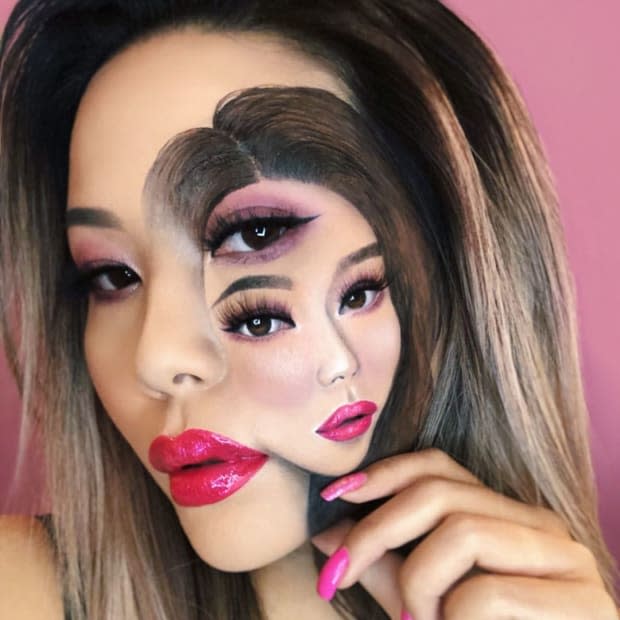
It seems like education has remained the constant throughout your different careers. Why is that such an important thing for you?
I like sharing and educating. I just love showing people how to do things if they're interested and to know that people are able to gain knowledge from you and to get something out of your teaching is so rewarding for me. When I do my classes it's not just teaching makeup. I like to talk about my journey, too, because I think a lot of young people find it inspirational that I changed my career so late in my life and that everything worked out.
What is your process like and where do you find inspiration?
Illusions in general take at least two hours, and up to 10 hours for me, but I don't have the patience to go beyond that. My process is different for each look because I don't really like to repeat looks. I learn something new each time. I think that's how I progress as an artist, I constantly push myself to do something that's different. That's challenging. I never stay within the comfort zone. I always try to leave that.
I get inspiration from many different sources, but I try not to look at other makeup artists. I look at other art forms, like paintings, photography, music, sculptures. I also get inspiration from Photoshopped art. When I see digital art online, sometimes I look at it, it's really cool. I want to create it with makeup — I don't Photoshop my work.
I also get inspiration from my sleep paralysis, my nightmares. I've had that since I was little and I hallucinate during my sleep paralysis and see really weird visions, frightening visions, and I paint them out. When I paint them out, for some reason I don't dream about them anymore. I dream about something else. Makeup, in a way, heals me and allows me to express myself and reveal my true self.
Do you have a favorite look you've done?
That's really hard because every one is special to me in its own way, but I would say recently the one that I did on Ezra [Miller] at the Met Gala was quite memorable just because of the experience. He had a vision that he wanted to be different, he wanted to start something new. It was really cool to see my work on a larger scale.
It had multiple eyes and a kind of blurry face, which means a lot to me because that was one of the major looks that jump-started my career in 2014 when I started exploring blurry faces, doing multiple features on the face.
I never expected the kind of reaction that it got. I did not know people would like it that much. I thought they'd be creeped out or disgusted or something, but people seemed to embrace it. I'm really grateful.
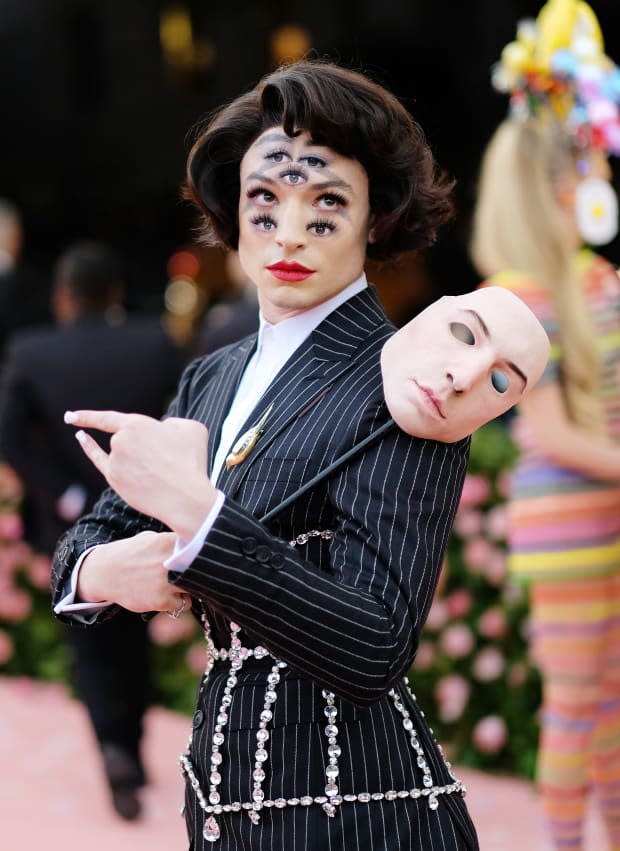
A lot of your looks are so realistic and sometimes a little bit disturbing and dark. What do you hope to communicate through your work, and what do you hope people take from seeing them? Do people ever react negatively?
I'm inspired by my fears. A lot of my looks are inspired by my emotions and my sleep paralysis. I totally understand if people find them frightening, but it is also my way to express myself. So if people react negatively I don't take it personally at all. They're free to feel whatever they want with my art and as long as I'm happy doing it and I'm not hurting anybody then I think everyone should be like that, should live that way.
At the end of the day we all have ourselves. We only live one life, right? You might find it bizarre that I like to paint weird things on my face and other people's faces to be happy, but that's what it is. It makes me happy so I'm going to continue to do it.
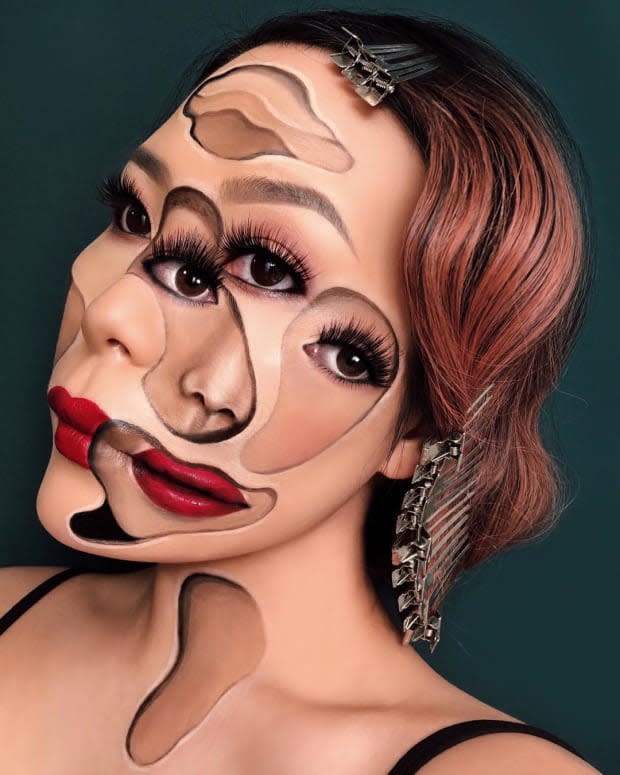
What career goals do you still have?
I think the important thing is just to keep evolving and creating new art and just staying happy. I might want to have a school, a studio in the future where I can share my knowledge, have small classes or whatever. I'd like to continue to share, to teach classes all over the world. And maybe have my own product line, who knows, but I just want to keep evolving as an artist and I don't want to limit myself.
What advice do you have for aspiring makeup artists or even just for someone who is, maybe like you were, stuck in a career path and thinking they can't make a change?
The most important thing for everybody, not just makeup artists, is to step out of your comfort zone. That's one thing that made me grow the most; whenever I feel comfortable in a situation for too long that means I'm not growing.
It's also really important to have a good attitude, because a lot of people have skills and talents and everything, but not a lot of people are pleasant to work with. So to stand out, to be visible, to have a place in this industry, it's important to have a good personality. To have grace, to be able to know how to work well with a team, to communicate well and be punctual and professional. I think that's really, really, important.
Please note: Occasionally, we use affiliate links on our site. This in no way affects our editorial decision-making.
Never miss the latest fashion industry news. Sign up for the Fashionista daily newsletter.
